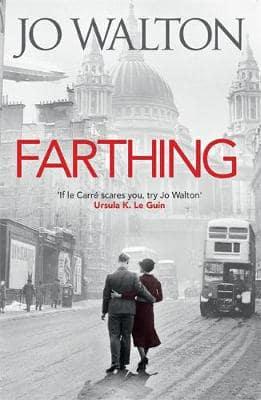Book Review: Farthing by Jo Walton
England didn’t win World War Two. In fairness, they didn’t lose either. Thanks to a coalition of wealthy nobles and businessmen, Rudolph Hess’ mission was a success, and the Axis were able to negotiate a peace settlement with Great Britain. This is generally considered a great saving of British lives that otherwise would have been lost in war, but not everyone is pleased that Nazi Germany has free reign over the Continent. When Sir James Thirkie, one of the Farthing set’s central people, is found dead under suspicious circumstances, the political implications are tremendous.

This alternate history murder mystery has two main viewpoint characters. The first is Mrs. Lucy Kahn nee Eversley. She’s been estranged from her Farthing Set family since marrying David Kahn, an ethnically Jewish banker, but was summoned for a weekend party. Lucy has an acutely developed gaydar (but uses some idiosyncratic vocabulary for the results) and is certain her husband isn’t the murderer despite a really blatant clue pointing in his direction. Her bits are told in first person.
Inspector Peter Anthony Carmichael of Scotland Yard is narrated in third person. He’s an intelligent, cultured man who isn’t satisfied with easy answers. This makes him a good detective, but can conflict with department politics. Inspector Carmichael also has a few dark secrets that come back to bite him.
The mystery aspects of the narrative read much like novels published during the interwar period (the author specifically acknowledges Josephine Tey and Dorothy Sayers.) Much of the social change that came about because of the war either never happened or was pushed back against with the abrupt ceasefire. Instead, a different and to my eyes far more dystopian set of social changes are occurring. Sadly, I know that there were–and are–people in England who would see these changes as a positive.
Nor, indeed, is the United States immune, as references to President Lindbergh and peace with the East Asian Co-Prosperity Sphere hint.
So far, the “Small Change” series has three books; I don’t know if it’s a trilogy or a continuing series.
Content note: Antisemitism, homophobia and xenophobia in general are a major current through the book and presumably throughout the series as a whole. If you’re looking for something to read that isn’t depressing, this book isn’t it.
I felt that Lucy was perhaps a little too accurate with her gaydar; a false positive or negative might have made it a bit more plausible.
That said, this is an overall well-written mystery that inspired some sobering thoughts. Recommended to alternate history mystery fans.

